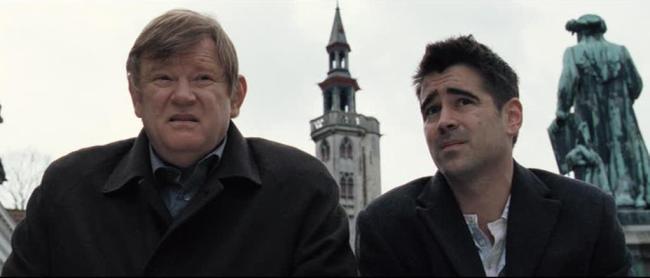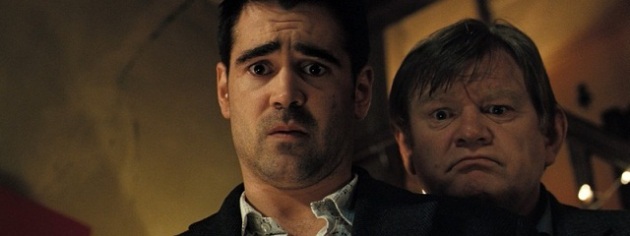
“After I killed them, I dropped the gun in the Thames, washed the residue off my hands in the bathroom of a Burger King and walked home to await further instructions. Shortly thereafter the instructions came through – ‘Get the f*ck out of London, you dumb f*cks. Get to Bruges.’ I didn’t even know where Bruges f*cking was…It’s in Belgium.” – Ray
An uproarious pitch-black comedy. An intimate character study. An enthralling hitman tale. A picturesque tour of a beautiful European city. A meditation on life, death, love, loss and the uncertainty of the afterlife. In Bruges is all these things and so much more. In his staggering debut film, Irish playwright Martin McDonagh crafted a wholly original story that effortlessly bridges multiple tones, feelings and genres. Even with the amazing script, the film could not have been successful without McDonagh’s mature and sophisticated directorial skills. McDonagh created a film that is both captivatingly entertaining and intensely philosophical without missing a single beat. Not only does this film deserve to be seen by everyone who appreciates thoughtful, original filmmaking, but it also deserves to be applauded as one of the greatest films of the 21st century.
Ray (Colin Farrell) and Ken (Brendan Gleeson) are two hitmen who have been ordered by their boss Harry (Ralph Fiennes) to hide out in the Belgian city of Bruges and await further instructions. It’s hinted at that their last job may not have been entirely successful, but the details regarding this are not instantly revealed. Ken enjoys sightseeing and spending time in the medieval city, but Ray finds it far too boring. He complains about having to follow Ken around and look at the old buildings; he would much rather spend time sneaking onto a film set and watching them film a dwarf (Jordan Prentice) or going on a date with the beautiful Chloe (Clémence Poésy). But there seems to be another reason for Ray’s lack of excitement in Bruges. Something seems to be eating away at Ray’s emotions and it may have something to do with why they were sent to Bruges in the first place.
Viewers may not be familiar with the city of Bruges before seeing this film (I certainly wasn’t), but it will be nearly impossible to forget about it after seeing this triumph of a film. From the opening shots that are hauntingly photographed by Eigil Bryld, Bruges seems to take on a life of its own. McDonagh has stated that he was inspired to write the film after visiting Bruges and experiencing two very different emotions. The part of him that was fascinated with the cobblestone streets and medieval buildings eventually led to the creation of Ken. The part of him that became bored in spite of the city’s picturesque beauty led to the creation of Ray. These are two characters that, in some ways, could not be more different from one another. Despite the film’s dark tones, Ray and Ken are a classic comedy duo. They’re always butting heads and their heated exchanges lead to some of the film’s funniest moments. While visiting the Basilica of the Holy Blood, Ken explains that the church contains a vial that is said to hold some of Jesus Christ’s blood. When Ken asks Ray if he would like to touch it, Ray, like a child, responds, “Do I have to?”

Balancing out the humor is the film’s thematic content, which McDonagh expertly weaves into the plot. While an immensely entertaining film if taken at face value, it becomes even richer when one begins to interpret the subtle themes that are bubbling below the surface of the plot. In a brief but incredibly important scene, Ray and Ken visit the Groeninge Museum. Among other paintings, the two men observe The Last Judgment by Hieronymus Bosch. The painting showcases Judgment Day and the punishment that will be inflicted upon the sinners of the world. This prompts Ray and Ken to begin discussing Judgment Day and the afterlife, specifically Purgatory. “Purgatory’s kind of like the inbetweeny one. You weren’t really shit, but you weren’t all that great either,” describes Ray. Bruges acts as a kind of Purgatory for the characters in the film. Ken loves it, but Ray hates it and both of them are stuck there, awaiting orders (or judgment) from their boss Harry. Both Ray and Ken openly admit to having done bad things in their life, but they basically seem to be good people. So what ultimately awaits them in the afterlife? Do they deserve to go to hell for the sins they committed? Were they good enough to get into heaven? Or will they be forever stuck in a Bruges-like state of Purgatory?
Yes, these two men are trained killers, but they’re also people with emotions, motives and backstories. McDonagh’s script never allows these characters to succumb to the clichés that can be so inherent in films involving hitmen. The profession that these characters have chosen is a part of them, but it’s far from a solely defining characteristic. Ray is a naïve young man who is quickly realizing that this profession may not be the best choice for him. After their last job went belly up, Ray is an emotional train wreck and Collin Farrell brings a vulnerability to a character that is teetering on the edge. He’s broken inside and his efforts to numb the pain are becoming increasingly more futile. Ken has a much more positive outlook on life and Brendan Gleeson brings an incredible amount of warmth and lovability to the role. Ken is the kind of guy that you would want to spend time with because he seems to see the best in people. He sees that Ray has his whole life in front of him and he still has the capacity to change it for the better. But that doesn’t mean that he hasn’t faced hardships: it’s revealed in the film’s second act that Ken lost someone close to him and this event may have led to his profession as a hitman. Finally, Harry doesn’t appear on camera until the film’s third act, but this doesn’t affect Ralph Fiennes’ commitment to his character or his performance. Like the other characters in the film, Harry has a code of honor, but that doesn’t prevent him from being erratic and terrifying. Harry is the kind of guy that you don’t want to cross; an employee at the Belfry of Bruges insults him and pays for it in an awful manner. Still, every action that Harry takes feels understandable and that’s a testament to the writing as much as it is to Fiennes’ performance.
McDonagh scatters plenty of foreshadowing throughout his film, but you aren’t likely to notice it on an initial viewing. As the film strides towards its conclusion, it’s almost impossible to predict what will occur from scene to scene. The climactic chase through the streets of Bruges is some of the best cinema you’re likely to see and it still manages to get my heart racing after so many repeat viewings. In the film’s final moments, the characters stumble onto a film set and appear to be walking through a fairy tale turned hellish nightmare. The actions, dialogue, choices and motivations of these characters all converge into a finale that feels utterly unpredictable, while still feeling like the only possible outcome based on everything that has happened previously. It’s an ending that feels perfect, not only for the film’s plot, but also for the themes that McDonagh is trying to convey.
Shot on location in the Belgian city of Bruges, the film manages to feel like a showcase for the beauty of the city, while also serving as a warning to stay away. Images manage to feel calm and unsettling, often within the same shot. The score from Carter Burwell begins as a melancholy personification of Ray’s remorse and depression, before evolving into a much louder, more rock heavy theme in the film’s climactic moments. Even though the film excels in practically every area, the most impressive aspect of In Bruges has to be its story. This is a story that flows naturally and succeeds because of its timeless quality. The lack of cars, computers, cell phones and other technologies make it a refreshing change of pace. Endlessly rewatchable and immensely quotable McDonagh’s debut feature only continues to improve with age. I try to avoid hyperbole as much as I can when writing reviews, but for In Bruges there’s one word that keeps coming to mind: masterpiece.
In Bruges receives 4/4
